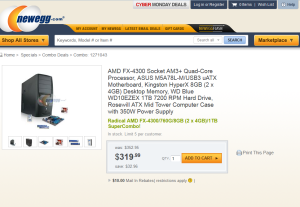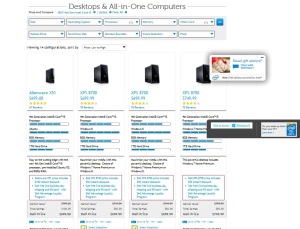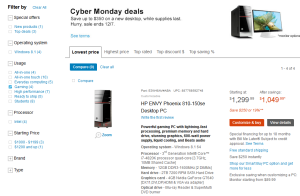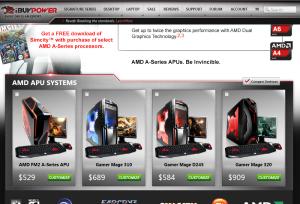 In
my previous post I promised that today I would address the issue of
pricing in the "PC vs Console" debate. Both sides make the claim that
their chosen platform is cheaper. Console gamers explain that a console
costs about $400 when new, far less when customers spend a year to
purchase, while PC gamers claim that PC gaming isn't as expensive as
people make it out to be. As you probably read in the pieces that
prompted these posts, Gordon and Klosowski make these arguments in their
pieces. A quick read through the comments sections will show that
players echo these arguments.
In
my previous post I promised that today I would address the issue of
pricing in the "PC vs Console" debate. Both sides make the claim that
their chosen platform is cheaper. Console gamers explain that a console
costs about $400 when new, far less when customers spend a year to
purchase, while PC gamers claim that PC gaming isn't as expensive as
people make it out to be. As you probably read in the pieces that
prompted these posts, Gordon and Klosowski make these arguments in their
pieces. A quick read through the comments sections will show that
players echo these arguments.Now, PC Gaming enthusiasts, go ahead. As a chorus: "I can build a gaming PC that can run everything on ultra high for 400$!!!"
No, you can't.
Now, it is unquestionable that with some knowhow an individual CAN build a computer with a budget as low as $300.00. The image below proves as much. It shows one of the lowest priced AVAILABLE bundle of parts from Newegg, a site popular for its low computer parts prices, on 12/2/2013.

However, this setup is hardly a gaming machine. This is hardly a gaming machine. The processor is quite underpowered when compared to the Intel i3 (the bottom of the line current-gen Intel processor), and it's lacking a graphics card.
In order to build an adequate gaming computer, one would have to invest roughly around $600 to $700... but I'm getting ahead of myself. To explain how pricing works for PCs, let us consider three different situations. On the first situation, let us consider a person who does not have a computer. For the second situation, let's take a person who has a fairly recent computer (at least i3, although I know plenty of people who still have dual cores) and is looking to upgrade some parts. For the third situation, let us consider a person who has a fairly outdated computer and needs a full overhaul. For each of these situations, we will consider as many possible ways of tackling the problem as possible. For the first situation - someone who is in the market for a new PC - we will look at prices for major retail brands (HP, Toshiba, Dell, Samsung), websites dedicated to gaming computers (Digital Storm, Alienware, Origin, Malibal), Sager/Clevo resellers (namely Xotic PC and iBuyPower), and the "build it yourself" route via newegg and Target Direct. For the second and third situations, we will start off with hypothetical builds and only calculate the cost of parts.
Before we move on, the skeptical reader will say "but my favorite online store for computer parts is not here". The reason that these sites were chosen is because they are the ones most frequently mentioned in online searches and the most credible retailers. A search for "cheap computer parts" will yield Tiger Direct and Newegg on the first two hits, several threads on Tom's Hardware with enthusiasts saying "check out Tiger Direct and Newegg", and a few sites with higher prices and bad reviews. Searches for "gaming PCs" yield mostly the above mentioned sites, and the more mainstream computer brands are the ones mentioned above. Yes, yes, we are all aware that there are MSI computers and ACER computers and a large number of other computer brands. With the exception of MSI computers, which are usually more expensive, other brands are usually roughly around the price of the most mainstream brands which have been taken here as a sample. Finally, do keep in mind, astute reader, that we are assuming that, for some reason or another, the customer in question has at least basic knowledge of how hardware works and is able to build a computer. Furthermore, we are under the assumption that the desired computer is meant to play games.
Situation 1: I Need a New Computer
For this first hypothetical situation, the individual in question does not have any gaming consoles or a home computer. He or she has played games in a neighbor's house. Recently, he or she finds some free time due to finishing a project, and decides to buy a new gaming platform. (If you, dear reader, don't like this situation, then feel free to make up your own where someone who doesn't have a game console or computer wants to buy one for play). The individual decides to buy a PC. This is what he or she will find:
Through Dell, customers will be able to buy a computer sporting a 4th generation i5, a dedicated video card (NVidia 635 or 645), and a cool 8 GB of ram for $700.00. Buying through Dell, customers will get a Windows 8 OS, while buying through Alienware they will get an Ubuntu system. This computer, of course, does not include a monitor. This will raise the price up an extra $200.00.
$900.00 seems a bit steep when compared to gaming consoles, so let's head over to HP. We go there in the hopes of finding an adequate computer - surely they won't have gaming rigs.
And yet, we find a "gaming" tab that presents us with computers that cost over $1,000.00, not including monitor. "That's too expensive for an HP", thinks our subject, and moves on to Toshiba and Samsung.
Over at Toshiba, we will find all-in-one computers that seem perfect for media, but don't really have the specs to support a good gaming experience. Furthermore, their starting price of over $900.00 seems fairly steep. They DO have a nice gaming laptop, a Quismo X, for $1,000.00, but when he asks their PC gaming friend, the friend says "there is no such thing as a gaming laptop". At the Samsung page, nothing but overpriced systems appear on the search.
Disheartened, our individual will take to the forums. They will inevitably get two suggestions: (1) go to a Clevo/Sager reseller, or (2) build your own. Not having enough time to build his own, our hero decides to go the custom gaming PC route. Online research leads them to Origin PC, Malibal, XoticPC, iBuyPower, and Digital Storm. Furthermore, having heard that they can hook up the computer to their TV makes them see computers as slightly more viable. So far, the Dell / Alienware $700.00 computer doesn't seem like such a bad deal. It's still not as cheap as a game console, but computers DO have a bit more versatility, and everyone says they're better, right? So we keep on doing research.
Over at OriginPC, the Chronos (small case) catches our eye. "Hm... this looks like something nice that I could have next to my TV..." then we see the price. Over $1,000.00 for a computer with nearly the same specs as the $700.00 Alienware and Dell computers seems a bit overpriced, even if the video card is a bit better. Over at Malibal we see only laptops. Good ones, we think, but "there is no such thing as gaming laptops", our friend said, so we move on. Over at XoticPC, there is an ugly little tower for a bit over $900.00. It's comparable to the Dell / Alienware in specs, but the graphics card is, again, a bit better.
Over at Digital Storm things look a bit more promising. There, we see the Vanquish, a stylish gaming PC featuring slightly better specs than the Dell / Alienware, for a cool $700.00. The question now becomes - do I want a computer with a better processor and a slightly slower video card, or the other way around? After reading on the forums, we decide to go with "better video card". So far, the Vanquish and its fourth gen i3 and NVidia GTX 650 seem to be a better deal than Alienware's fourth gen i5 with a GTX 635. But we keep on hunting and eventually land at iBuyPower and notice its $550.00 computer. We click on it.
Quickly, we notice that their very cool looking systems are powered by the AMD A6 Dual Core processor, one that is consistently trounced in benchmark tests against pretty much anything, and that it has integrated graphics. This computer reminds us of that thing we type on at work or at the university's library, but with a cool case.
In most places, a good gaming computer will come out to $900.00, with the exception of two places. And so, we begin to regard those two places - Dell (Alienware belongs to Dell) and Digital Storm - with interest, because we're not willing to spend $900.00 on a gaming PC. After all, we were told that "you can build a gaming PC that runs everything on max for under $400.00.
And then it hits us. We BUILD the computer. So we search - where to build a computer. Research leads us to Target Direct and Newegg.
After a bit of poking around the Tiger Direct website, we find what we want: barebones kits. We quickly notice different categories: Everyday (up to $200), Performance (up to $500), Enthusiast (up to $1,000), and Gamer (above $1,000). We start our browsing.
The everyday section yields bundles without CPUs and without video cards, we quickly discard all of them as possibility. In the up to $500.00 range, we find a number of case + processor + integrated graphics bundles that don't include ram or HDDs, on the lower end of the price range and a few full kits with integrated graphics on the higher end of the range. We notice, in fact, that none of the bundles actually bring video cards unless they're in the "gamer" category. We think that it might be worthwhile to buy one of the i3 or i5 bundles - they go for around $450.00, after all, and then buy the video card. We quickly find the GTX 650 retailing for around $100.00, and we do the math. A $450 barebones kit + a $100 video card + $100 for the OS + $50 for mouse and keyboard... we might as well get that Digital Storm Vanquish! It's roughly about the same price, and we don't have to waste time building it and potentially burning some of the parts down (specially the CPU) due to forgetting something like thermal gel.
Certainly, the majority of people won't even bother checking for parts as they don't have the training or knowledge required to work with them, so under this scenario a $700.00 i3 with a GTX 650 and 8 gigs of ram is the best option if we're looking to dispel the price myth.
This moves us to the next scenario:
Situation 2: I Need to Upgrade a New-ish Computer
This is the most frequent scenario that PC apologists use when trying to dispel the "PCs are expensive" myth. The way that the argument goes is something along the lines of "everyone has a PC so an upgrade shouldn't take too much". If this situation is true, then it certainly is correct that an upgrade is cheaper than a new computer. If the person in question has an i3 processor in their computer (or something more recent), it is likely that they bought their computer in the last two to three years. In this case, they may need a new video card (we have already seen the GTX 650 retail for about $100.00, better ones will run for about $200.00. This will leave users with at least an i3 (hopefully quad core), a GTX 650, and some 8 gigs of ram. Anything other than this (say Dual Cores, or Celerons) and it may be better to follow Situation 3.
Still, there is one key problem with this situation, and that is that most people, as I have repeatedly stated, don't have the knowhow or the courage to open up a computer. And so, what usually happens is that they will wait out a few more years before buying a new computer. In that case, refer to Situation 1.
Situation 3: I Need to Upgrade my Old Computer
Let's say that the old family Pentium II running on Windows 95 finally broke down. It's time to get a new computer, or update to a new one.
In order to decide what to do, refer back to Situation 1.
Investment Beyond the Original
And so, as we have seen, it is not possible to buy or build a gaming computer for anything below $699, at least not something that will run modern games. Yes, there are AMD and Intel bundles with integrated graphics for 500$ out there, but they don't really work as advertised. These are not gaming machines as much as they are multimedia machines - great for consuming video and casual games, but certainly not for Bioshock Infinite. Those who want a computer with specs that will let them play games for the next few years will want AT LEAST an i3 with a GTX 650. As someone who has a similar setup (mine is actually an i7), I know that this setup will let people run games like The Witcher 2 and Battlefield 3 at high settings and 60-ish frames per second at 1080 resolution. The wild claims that these computers can do "way higher" without any drop in performance are exaggeration. This is specially true when they claim that they can run these games on Ultra at more than 60 frames per second. The $700 model that we have built ($900 if in a laptop) can run any modern game at high, 60 frames per second, 1080 dpi. As technology moves forward, it's likely that these systems will be able to run games at mid-high, then mid, then low for the next 4 - 5 years. That is how often one usually upgrades a video card. This is another extra added cost to the computer system.
Three years (on average) after having spent $700 on the Vanquish, users will have to upgrade their video card if they want to keep playing the games at specs comparable to their console counterparts. Then again in another three years. That's an extra 300$ - 500$ on top of the original investment.
And so, in one console cycle, someone buying a computer at the beginning of the cycle (let's take the current one) will have to spend about $1,200 on the system alone. The console, which does not need to be updated, will cost $500 at most.
And yes, I know, I know, Steam sales, free to play, computers can do spreadsheets, etc. Doesn't matter. That's not the question at hand. Learn to focus, PC gamers. The question is not even "which console is cheaper" (the answer to that would be last gen's consoles going on clearance - a PS3 with Arkham Origins and The Last of Us for $250 seems to me like a sweeter deal than any 8th gen console or any computer). The question is, is the myth of the expensive gaming computer real? And the unquestionable answer is "yes". A GOOD low end gaming rig (something that can run everything current on fairly good settings but will need an upgrade in a few years) will run $700. A REAL gaming beast may start at the $3,000 range and go up to over $20,000. Just go crazy over at Falcon Northwest and you'll see what I mean.
In all seriousness, however, building a computer that will be able to run all games throughout a console's lifespan will cost about $1,200. The alternative is to buy a lower end gaming machine and update it throughout, which will end up costing about just as much.
The Verdict
So what's the verdict?
Who wins in the PC vs. Computer debate?
Honestly, it depends on two major factors.
The first factor is the "philosophy of play" of an individual. If an individual thinks that games are largely toys or play objects, that games should be devoid of narrative, that games should resemble traditional (read - board games, playground play) games, or prefer games that can be modded infinitely, then PCs are a better choice. If they think that games are to be enjoyed relaxing, they are not too big on online play, enjoy games with stories, or see games as more than play objects, then videogame consoles are a better choice. A simplification of this "philosophy of play" question is the question: League of Legends or The Legend of Zelda?
The second factor is the "philosophy of the box". Computers are far more versatile than consoles and allow for a broad number of tasks. If someone thinks that they will either use the computer to play and do other things (work / study), then the extra investment in a computer is a great idea. However, if someone has no interest in using the internet, watching Youtube, writing blogs, or anything like that, and they just want a dedicated gaming machine, then consoles are the way to go.
The Personal Closing Comments
As for myself, I must admit that while I like my computer (i7 GTX 650 laptop. Yes, a gaming laptop) far more than I do any of my consoles, that I use my computer in far more productive ways than my consoles, and that I spend a bit more time on my computer than on my consoles (family taking over the consoles might have something to do with that), I will take playing games on a console over playing games on a computer any day. As much as I love Antichamber, Amnesia, Bastion, Super Hexagon, and Rusty Hearts, I would rather sit down and play Super Mario Galaxy or QTE through Beyond: Two Souls (which I will be doing shortly). I will take any console exclusive RPG over any PC exclusive anything any day. And while, yes, there are some great gems on the PC (I'm still looking forward to when I have time to play Recatter), the games that I am personally interested in that are PC exclusives are few and in between.
Maybe in some future all game companies will have their own distribution systems and sell games only through digital storefronts straight to a user's computer. In that game console-less future, users will be able to play all the awesome Atlus, Nintendo, Naughty Dog, and Square Enix games on the PC, and I will be the first to buy a cool looking box with flame stickers to put somewhere around my TV set. Until that happens, the only boxes around my TV set should say "Box", "Station", or "Nintendo" somewhere on the body.
*NOTE:
Stay tuned for the start of a longitudinal experiment sometime this week.







No comments:
Post a Comment